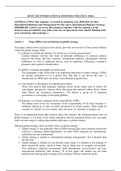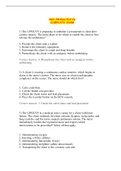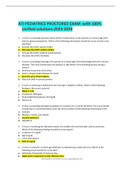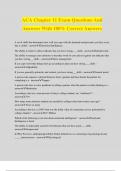ARTICLES INTERNATIONAL BUSINESS STRATEGY (MSc)
GENERAL INFO: This summary is created in academic year 2020-2021 for MSc
International Business and Management for the course International Business Strategy
EBM088A05. I advise you to use this summary together with the summary of the
lectures (also provided by me). This exam was an open book exam which I finished with
an 8. Good luck with studying! (:
Article 1 Peng (2009): Current debates in global strategy
This paper, distinct from a typical review article, provides an overview of four current debates
within the global strategy field:
(1) cultural vs institutional distance which one is a better measurement?
Cultural distance involves the study of principle differences in national cultures
between the home and host countries. Institutional distance encompasses cultural
differences as well as additional factors, such as regulatory differences, normative
pressures and cognitive identification.
(2) global vs regional geographic diversification
The geographic scope of the firm is an important dimension in global strategy. MNEs
are mostly considered to be a global firm. But that is not always the case. A
classification as MNE does not mean a classification as global firm.
(3) convergence vs divergence in corporate governance
Those who believe that economic ideology drives social values tend to follow the
convergence perspective, whereas those who argue that national culture drives values
often follow the divergence perspective. The debate is going on if corporate
governance is converging or diverging globally.
(4) domestic vs overseas corporate social responsibility (CSR)
The debate stems from two viewpoints of the responsibility of the firm: freeman vs
friedman. Moreover, to take on which perspective in which country. What might be
‘normal’ or ‘ethical’ in your country, does not mean it is ethically in another one.
There is an underlying theme that connects these four debates: the institution-based view of
global strategy. It is a sense of the broad connection that the institution-based view can make
with a diverse range of cutting-edge debates and topics in global strategy.
Defining global strategy: there are three views on global strategy:
1. Global strategy is one particular form of MNE strategy that treats countries around the
world as a common, global marketplace. As other MNE strategies are international,
multidomestic and transnational.
2. Global strategy is treated as ‘international strategic management’, this is broader than
the first one.
3. Global strategy is defined in even broader terms where it is defined as the strategy of
firms around the globe, which is firms’ theory about how to compete successfully.
This definition explicitly incorporates both international (cross-border) and non-
international (domestic) firm strategy. in this paper, the authors use the third
definition by treating global strategy as the strategy of firms around the globe.
, Institutions = the rules of the game. All works associated with the external environment can
be labeled as an institution-based perspective. International firms must know and be aware of
the formal and informal rules governing those countries they are vested in. The institution-
based view suggests that firm strategies are enabled and constrained by the different rules of
the game around the world.
An institution-based view suggests two competing propositions:
- The formal institutions may appear to be converging, as common legalization or
governing systems are adopted
- The informal institutions at work may not actually implement these convergence
mechanisms.
Article 2 Maitland, E., & Sammartino, A. (2015). Managerial cognition and
internationalization. Journal of International Business Studies, 46(7), 733-
760.
A firm’s expansion across national boundaries presents managers with the task of choosing
what is the best option, taking the possibilities into account. A central premise is that as
managers differ in their experience-based expertise, then individual-level differences in
experience, learning and decision-making are a likely source of heterogeneity in firm-level
strategic decisions. Drawing on this research, it is argued that in the three leading
internationalization models (internationalization, the internationalization process and
institutional theory) the MNE decision maker is underspecified.
LOF/FSA and OLI Paradigm is explained and defined in this article.
We argue that the boundedly rational decision-maker is underspecified in international
business models and this oversight contributes to weak empirical findings on experience,
learning, internationalization strategy and MNE performance. Drawing on these extant
models, we identify seven knowledge domains and interdependencies that may make up
decision-makers’ mental models. Granted rare access to senior executives and board members
engaged in a foreign direct investment decision, we find substantial heterogeneity in the
mental models these indivi- duals used to make sense of the opportunity. This variance aligns
with differences in individuals’ experience along four dimensions:
1. international breadth
2. depth
3. diversity
4. prior strategic decision-making
We argue these cognitive processes – how individuals exercise judgment about information
search para- meters, assessment and decision integration, and how decision teams coalesce in
their thinking – are crucial microfoundations for modeling heterogeneity in firm-level
internationalization strategies and performance.
Main findings: Multinational knowledge may be the most effective in assessing and
addressing LOF. Such knowledge derives from richer learning opportunities afforded by
diverse location experience and managing/making decisions internationally. Results argue
against the assumptions that MNE experience directly translates into effective learning.
However, international experience matters and makes people more valuable for companies.
GENERAL INFO: This summary is created in academic year 2020-2021 for MSc
International Business and Management for the course International Business Strategy
EBM088A05. I advise you to use this summary together with the summary of the
lectures (also provided by me). This exam was an open book exam which I finished with
an 8. Good luck with studying! (:
Article 1 Peng (2009): Current debates in global strategy
This paper, distinct from a typical review article, provides an overview of four current debates
within the global strategy field:
(1) cultural vs institutional distance which one is a better measurement?
Cultural distance involves the study of principle differences in national cultures
between the home and host countries. Institutional distance encompasses cultural
differences as well as additional factors, such as regulatory differences, normative
pressures and cognitive identification.
(2) global vs regional geographic diversification
The geographic scope of the firm is an important dimension in global strategy. MNEs
are mostly considered to be a global firm. But that is not always the case. A
classification as MNE does not mean a classification as global firm.
(3) convergence vs divergence in corporate governance
Those who believe that economic ideology drives social values tend to follow the
convergence perspective, whereas those who argue that national culture drives values
often follow the divergence perspective. The debate is going on if corporate
governance is converging or diverging globally.
(4) domestic vs overseas corporate social responsibility (CSR)
The debate stems from two viewpoints of the responsibility of the firm: freeman vs
friedman. Moreover, to take on which perspective in which country. What might be
‘normal’ or ‘ethical’ in your country, does not mean it is ethically in another one.
There is an underlying theme that connects these four debates: the institution-based view of
global strategy. It is a sense of the broad connection that the institution-based view can make
with a diverse range of cutting-edge debates and topics in global strategy.
Defining global strategy: there are three views on global strategy:
1. Global strategy is one particular form of MNE strategy that treats countries around the
world as a common, global marketplace. As other MNE strategies are international,
multidomestic and transnational.
2. Global strategy is treated as ‘international strategic management’, this is broader than
the first one.
3. Global strategy is defined in even broader terms where it is defined as the strategy of
firms around the globe, which is firms’ theory about how to compete successfully.
This definition explicitly incorporates both international (cross-border) and non-
international (domestic) firm strategy. in this paper, the authors use the third
definition by treating global strategy as the strategy of firms around the globe.
, Institutions = the rules of the game. All works associated with the external environment can
be labeled as an institution-based perspective. International firms must know and be aware of
the formal and informal rules governing those countries they are vested in. The institution-
based view suggests that firm strategies are enabled and constrained by the different rules of
the game around the world.
An institution-based view suggests two competing propositions:
- The formal institutions may appear to be converging, as common legalization or
governing systems are adopted
- The informal institutions at work may not actually implement these convergence
mechanisms.
Article 2 Maitland, E., & Sammartino, A. (2015). Managerial cognition and
internationalization. Journal of International Business Studies, 46(7), 733-
760.
A firm’s expansion across national boundaries presents managers with the task of choosing
what is the best option, taking the possibilities into account. A central premise is that as
managers differ in their experience-based expertise, then individual-level differences in
experience, learning and decision-making are a likely source of heterogeneity in firm-level
strategic decisions. Drawing on this research, it is argued that in the three leading
internationalization models (internationalization, the internationalization process and
institutional theory) the MNE decision maker is underspecified.
LOF/FSA and OLI Paradigm is explained and defined in this article.
We argue that the boundedly rational decision-maker is underspecified in international
business models and this oversight contributes to weak empirical findings on experience,
learning, internationalization strategy and MNE performance. Drawing on these extant
models, we identify seven knowledge domains and interdependencies that may make up
decision-makers’ mental models. Granted rare access to senior executives and board members
engaged in a foreign direct investment decision, we find substantial heterogeneity in the
mental models these indivi- duals used to make sense of the opportunity. This variance aligns
with differences in individuals’ experience along four dimensions:
1. international breadth
2. depth
3. diversity
4. prior strategic decision-making
We argue these cognitive processes – how individuals exercise judgment about information
search para- meters, assessment and decision integration, and how decision teams coalesce in
their thinking – are crucial microfoundations for modeling heterogeneity in firm-level
internationalization strategies and performance.
Main findings: Multinational knowledge may be the most effective in assessing and
addressing LOF. Such knowledge derives from richer learning opportunities afforded by
diverse location experience and managing/making decisions internationally. Results argue
against the assumptions that MNE experience directly translates into effective learning.
However, international experience matters and makes people more valuable for companies.











